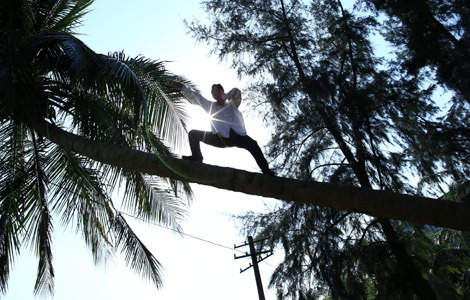From the Chinese press
Updated: 2013-11-01 07:16
(China Daily)
|
|||||||||||
Resist extremism in Xinjiang
In recent years, the infiltration of Islamic fundamentalism and extremism into the Xinjiang Uygur autonomous region is threatening the region's social stability and healthy economic and social development. We should resolutely resist the penetration of extremist religious ideas, says Xinjiang Daily. Excerpts:
As we all know, the rise of Islam has more than 1,400 years of history and it has developed into a world religion for multiple nationalities. After spreading across the world and going through different stages of development, Islam shows two essential features: unity and diversity.
Muslims around the world have different ethnic cultures, which is reflected in their respective customs, literature and art, values, thoughts and feelings. These are part of a nation's cultural traditions and characteristics.
Yet although Muslims in different parts of the world may have different rituals, customs, clothing and many other aspects of life, they share their belief in Islam. As long as Muslims around the world do not violate the basic tenets of Islam, their colorful traditional culture will be recognized by most of the world's Muslim communities. It is the existence of these differences that has created the colorful and diverse Islamic culture and civilization.
In recent years, the infiltration of Islamic fundamentalism and extremism into the Xinjiang Uygur autonomous region is threatening the region's social stability and healthy economic and social development.
Religious extremism is promoting the Islamization of society and the negative impact it is having is increasingly prominent. More and more Uygur women no longer wear colorful Uygur costumes. In some areas of southern Xinjiang, music, traditional dances, painting, sculpture and some other social and cultural activities are banned and even some Uygur wedding and funeral customs are blamed because they are said to violate Islam. Islamic fundamentalist extremists deliberately strengthen the public's consciousness of religious identity through various means, and deliberately bloat the atmosphere of religious extremism with the purpose of gradually eroding and even extinguishing the traditional Uygur culture.
In essence, Islamic fundamentalism is the product of religious politicization in the Islamic revival movement. The salient feature of Islamic fundamentalism is to transform Islam into an exclusive political ideology and use it as a tool to exclude, oppose and replace all non-Islamic ideologies, political systems and lifestyles.
Islamic fundamentalists use a thinking pattern of binary opposition to view and understand the world, which has strong exclusivity. It not only rejects the existence of all different cultures and all pagan beliefs, it also rejects the homogenous culture and beliefs because there are certain disparities and differences between these cultures, beliefs and their extremist religious ideas. The radical views and fanatical behavioral pattern of the fundamentalists completely violate the spirit of tolerance, moderation, mutual respect and harmony of Islam.
Islamic fundamentalists have an extremely narrow interpretation of the Quran, and, in the name of religion, they are inciting the masses to achieve their ulterior political motives. Their fundamentalism and extremist ideas ignore the history and reality of the diversity of Islamic culture and they want to "purify" the religion and beliefs and exclude dissidents with extreme measures.
In the name of religion, they insult and belittle ethnic traditions, trying to penetrate some countries and regions with their extremist ideas. Gradually they erode and eliminate traditional ethnic religions and cultures, and reshape the political and social ideologies in these countries and regions.
These practices go against the wishes of the majority of people and deviate from the mainstream ideology, culture and belief of society. It can be predicted that if the Islamic fundamentalists are allowed to run amuck in society, it will inevitably cause more social conflict and frictions. Islamic fundamentalism and extremist ideology is unsuitable for Xinjiang's social situation and is against popular sentiment, it will cause irreparable damage to traditional Uygur culture and enormous damage to the diversity of Islamic civilization.
(China Daily 11/01/2013 page9)
Today's Top News
Firms heading home as benefits wane in China
US urged to explain phone taps
Disclosure of WTO report rebuked
Vaccine gets nod for global use
Freer RMB 'can answer US claims'
'Dangerous provocation' condemned
Promoting baby formula prohibited in hospitals
Police told to protect medical workers
Hot Topics
Lunar probe , China growth forecasts, Emission rules get tougher, China seen through 'colored lens', International board,
Editor's Picks

|

|

|

|

|

|





